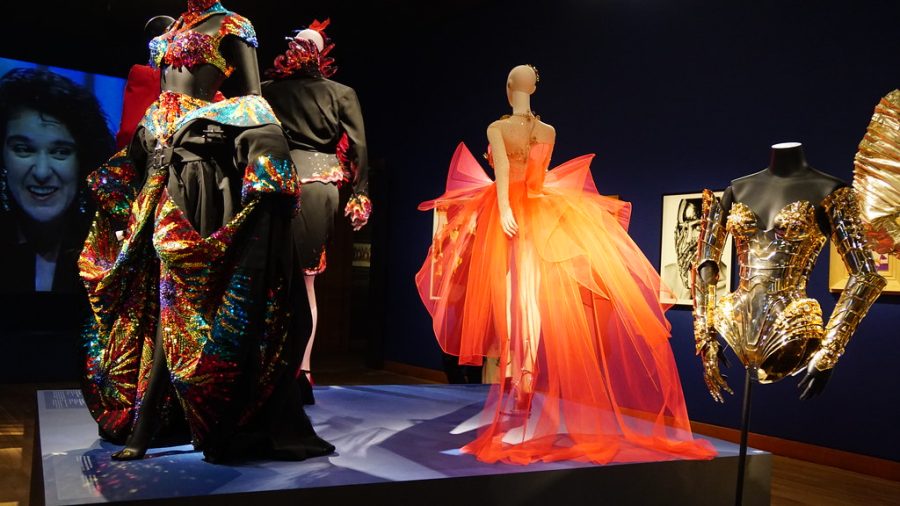Column: Mugler’s boldness, creativity leaves unique legacy on fashion world
“Thierry Mugler MBAM(15)” by rverc is licensed under CC BY-NC-ND 2.0
January 29, 2022
Manfred Thierry Mugler, esteemed French fashion designer and founder and creative director of the Mugler fashion house, died Jan. 23. He was 73. Known for his flamboyant and avant-garde style, Mugler changed the fashion and perfume industries with his visionary ideas. His death left shockwaves throughout the design world.
Mugler set the 1980s and 90s ablaze with outrageous, over-the-top fashion that challenged the boundaries of runway art. He rejected minimalism and surrounded himself with extravagant color and a love of latex, leather and architectural, artistic silhouettes.
Mugler launched his brand of camp, yet high-fashion and extremely sculpted designs in 1973. He made his mark by establishing his signature shape: an upside-down triangle formed by wide, powerful shoulders and small, drawn-in waists. He wanted his designs to remove viewers from reality and give them a taste of the larger-than-life fantasy he aimed to create.
From Beyoncé to Cardi B to David Bowie, big-name celebrities across decades have grasped at the chance to don that spectacular fantasy. Mugler’s runway shows went above and beyond mere fashion shows; they were theatrical performances. Separating himself from ordinary designers, Mugler inserted a level of theatricality that brought runway models out of the classic silent walk.
“The catwalk as I understood it was a kind of kabuki, a choreography of gorgeous human animals that chew up the scenery and the audience,” said Mugler in an interview with Women’s Wear Daily. “They have an extraordinary animal presence and a control, a know-how.”
His legendary 1984 show at the Zénith Paris stadium, for instance, became iconic for its elaborate performance elements. Model Pat Cleveland descended from the ceiling after runway models adorned with angel wings finished walking. The stage was covered in paper snowflakes, music was blaring and lighting focused on Cleveland.
Mugler designed every aspect of the show himself — not only the garments, but also the stage, choreography, lighting and audio. Every detail was infused with Mugler’s vision.
That’s what his shows were — memorable, overdramatic experiences that left buyers and viewers craving more Mugler.
By the mid-90s, Mugler faded out of the fashion scene. By the 2000s, he practically “quit” the industry altogether, supposedly because he was bored by the minimalist style that rose to popularity on heroin-chic runways. His next career move before returning to fashion, perfume, was equally as quintessential to the Mugler legacy. His staple perfume, Angel, a warm vanilla and honey scent, was also wildly successful, and the product cemented his name in the perfume industry.
While continuing his work with perfumes, he came out of retirement with several large splashes in the fashion industry, including the notable “wet” dress that Kim Kardashian wore to the 2019 Met Gala.
Not only was Mugler breaking boundaries in fashion, he was also fighting systemic homophobia. The height of his career coincided with the height of the AIDS epidemic, which rapidly generated further stigma against the LGBTQ+ community. Mugler, however, was openly gay and did not shy away from his sexuality. He was transparent with his acceptance of his community despite the backlash and criticism he faced.
He dressed how he pleased in extravagant outfits, sent drag queens and porn stars down the runway, released his nudes to the public and chose to be as explicit and outrageous as he possibly could. Mugler always did Mugler, no matter the public reaction.
Now in his death, celebrities, designers, friends and family mourn the loss of such a significant icon in fashion history. Many reacted on social media, including Cardi B, who said, “Mr. Mugler was still putting his foot on necks at 73 years old!!! A true inspiration for all of us.”
Kim Kardashian, with whom Mugler worked with often, said, “My heart breaks. There’s no one like you!”
Avant-garde and camp fashion would not be where it is today without Mugler, a designer so confident in pushing the boundaries of what was acceptable, wearable and truly fashionable. The legacy he leaves behind will remain an inspiration for new generations of designers to come.







